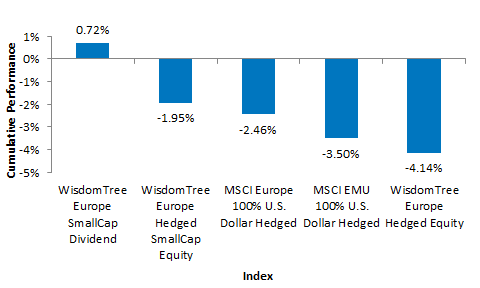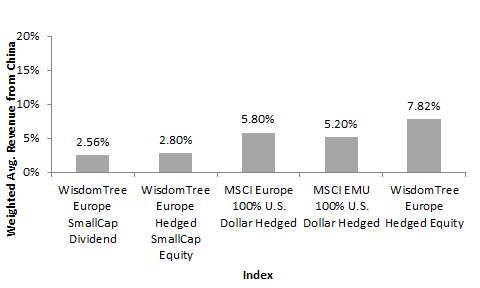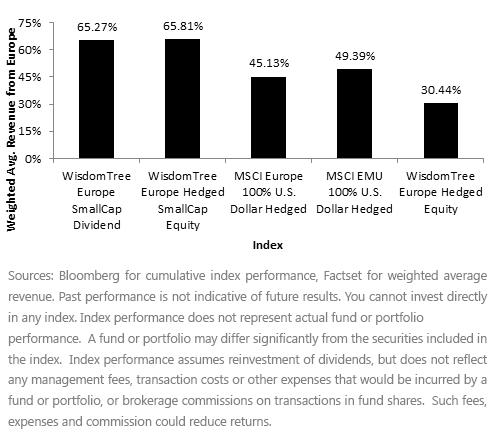Finding European Exposure Less Sensitive to the Chinese Currency Devaluation




 • Small Caps Had Significantly Less Revenue from China: For the WisdomTree Europe SmallCap Dividend and WisdomTree Europe Hedged SmallCap Equity Indexes we estimate that 2.6%–2.8% of their weighted average revenues came from China as of July 31, 2015. This is approximately half of what we saw for the MSCI Europe US Dollar Hedged and MSCI EMU 100% Hedged to USD Indexes, and significantly less than the 7.8% weighted average revenue from China that we estimate for the WisdomTree Europe Hedged Equity Index. It’s worth noting that for the WisdomTree Europe Hedged Equity Index, this means that we estimate 92.2% of weighted average revenues not coming from China.
• Small Caps Generate Two-Thirds of Their Revenues from Within Europe: The WisdomTree Europe SmallCap Dividend and WisdomTree Europe Hedged SmallCap Equity Indexes saw approximately two-thirds (over 65%) of their weighted average revenues coming from within Europe. Not one of the three indexes focused on large caps that we showed cracked the 50% mark.
European Completion
The week of August 7 to August 14, 2015, was just that—a one-week period. Yet it is illustrative of a bigger concept: European completion, namely by taking small caps into consideration, one can diversify the markets where companies receive revenue. Large caps tend to be more sensitive to the global economy and could face pressure if there are continued worries about an Asian currency war breaking out, while small caps are one way to position for an improving European economy.
1Source for bullet points: Bloomberg, for period 8/7/15–8/14/15.
• Small Caps Had Significantly Less Revenue from China: For the WisdomTree Europe SmallCap Dividend and WisdomTree Europe Hedged SmallCap Equity Indexes we estimate that 2.6%–2.8% of their weighted average revenues came from China as of July 31, 2015. This is approximately half of what we saw for the MSCI Europe US Dollar Hedged and MSCI EMU 100% Hedged to USD Indexes, and significantly less than the 7.8% weighted average revenue from China that we estimate for the WisdomTree Europe Hedged Equity Index. It’s worth noting that for the WisdomTree Europe Hedged Equity Index, this means that we estimate 92.2% of weighted average revenues not coming from China.
• Small Caps Generate Two-Thirds of Their Revenues from Within Europe: The WisdomTree Europe SmallCap Dividend and WisdomTree Europe Hedged SmallCap Equity Indexes saw approximately two-thirds (over 65%) of their weighted average revenues coming from within Europe. Not one of the three indexes focused on large caps that we showed cracked the 50% mark.
European Completion
The week of August 7 to August 14, 2015, was just that—a one-week period. Yet it is illustrative of a bigger concept: European completion, namely by taking small caps into consideration, one can diversify the markets where companies receive revenue. Large caps tend to be more sensitive to the global economy and could face pressure if there are continued worries about an Asian currency war breaking out, while small caps are one way to position for an improving European economy.
1Source for bullet points: Bloomberg, for period 8/7/15–8/14/15.
Important Risks Related to this Article
Investments focused in Europe increase the impact of events and developments associated with the region, which can adversely affect performance.
Investments focused in China increase the impact of events and developments associated with the region, which can adversely affect performance.
Investments in currency involve additional special risks, such as credit risk and interest rate fluctuations.

Christopher Gannatti began at WisdomTree as a Research Analyst in December 2010, working directly with Jeremy Schwartz, CFA®, Director of Research. In January of 2014, he was promoted to Associate Director of Research where he was responsible to lead different groups of analysts and strategists within the broader Research team at WisdomTree. In February of 2018, Christopher was promoted to Head of Research, Europe, where he was based out of WisdomTree’s London office and was responsible for the full WisdomTree research effort within the European market, as well as supporting the UCITs platform globally. In November 2021, Christopher was promoted to Global Head of Research, now responsible for numerous communications on investment strategy globally, particularly in the thematic equity space. Christopher came to WisdomTree from Lord Abbett, where he worked for four and a half years as a Regional Consultant. He received his MBA in Quantitative Finance, Accounting, and Economics from NYU’s Stern School of Business in 2010, and he received his bachelor’s degree from Colgate University in Economics in 2006. Christopher is a holder of the Chartered Financial Analyst Designation.

